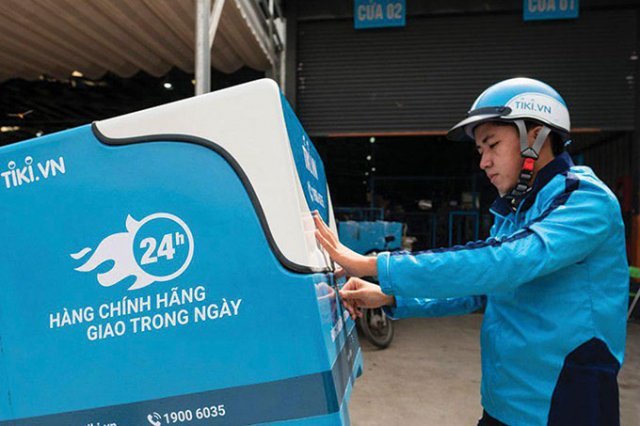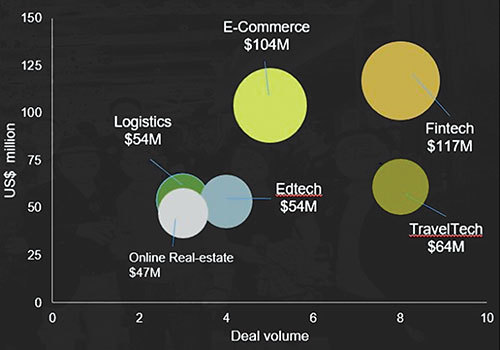 |
Like elsewhere in the world, digitalization or digital transformation is emerging in all fields in Vietnam, from trade and banking and finance to health, education, tourism, and transportation.
Vietnamese startups have been seizing the opportunities the digital economy presents to develop and thrive, with most based on technology platforms and many providing technology services to Vietnamese customers.
Abreast of trends
A typical example in the field of transport, the Vietnam-based logistics startup LOGIVAN offers a central technology platform that tracks the location of freight and trucks, enabling it to optimize truck routes and reduce empty load return rates.
To book a truck, customers need only contact LOGIVAN online and indicate how many trucks they require and what type of cargo they need delivered. “Technology is LOGIVAN’s biggest business advantage compared to traditional businesses,” Ms. Pham Khanh Linh, Founder of LOGIVAN, told VET.
It currently has 26,000 truck drivers and 14,000 customers around Vietnam, with the total value of its services standing at around $13.7 million per year. Of note, it raised $5.5 million in a funding round from angel investors and venture capital firms in Asia during February.
There are more than 1,300 logistics enterprises now operating in Vietnam, according to the Vietnam Logistics Business Association. Eighty per cent are domestic concerns, but they hold just 20 per cent of the logistics market share in the country, with the remaining 80 per cent held by foreign-invested enterprises.
Ms. Linh believes, however, that the digital economy opens up opportunities to conquer the world, especially for Vietnamese startups. “Once the technology is fully-mastered, smart and flexible startups have a huge advantage to catch and even surpass world leaders in their field of business,” she said.
One of the first e-commerce startups in Vietnam, in 2010, Tiki offers two unique sales propositions: two-hour delivery and a single detailed page that makes it easier to locate the right product, both of which are very much tech-driven initiatives and ensure a world-class customer experience.
When customers visit an e-commerce site, different vendors may offer the same product but at a different price, which can be confusing. Tiki’s single detailed page, however, presents clear and concise listings under a master Stock Keeping Unit (SKU). This makes shopping easy and less stressful.
Instead of being confused by a bunch of similar products at different price points, customers now can land on a single detailed page. It’s a heavy investment in platforms and technology to offer a simpler customer experience.
Tiki offers authentic products and services to millions of customers nationwide. Its revenue during the recent Tet holiday increased 300 per cent year-on-year. Mr. Kartick Narayan, Chief Business Officer at Tiki, told VET that technology is at the forefront of decision-making. “It’s not only our biggest asset but also a great driver of all our activities, including the user experience, pricing technology, and operations,” he said.
While also in the online shopping business, Leflair offers premium brands and uses a flash-sales model, providing customers with limited-time-only deals on premium brands, with discounts of up to 70 per cent. It records buying and selling activities in a database, which gives it an insight into customer behavior so it can adjust its methods and increase efficiency.
Mr. Loic Gautier, Co-founder and CEO of Leflair, said the development of the digital economy and online platforms such as e-commerce, social networking, and online payment, helps people access products and services faster.
“This is an important change, with businesses not having to wait for the development of infrastructure before expanding their business,” he said. “They can now take advantage of the internet and online platforms to develop their business. Choosing an online business model helps us approach and provide more value to those who love luxury brands. Whether they live in major cities like Hanoi or Ho Chi Minh City or anywhere else, through Leflair’s online platform they can find branded goods at the best prices.”
Thanks to the digital technology, Leflair has notched up over 1.5 million monthly visits and offers more than 1,500 local and international brands in its exciting flash-sales programs. It recently announced a Series B funding round of $7 million, from GS Shop and Belt Road Capital Management, bringing its total financing to date to close to $12 million.
Among major startups in the field of tourism, home-sharing platform Luxstay’s technology platform links demand for vacation rentals among travelers with homeowners. It has developed a network of more than 10,000 apartments owned by more than 3,000 homeowners in Vietnam’s cities and provinces. Average revenue to homeowners over the last three months stands at some VND30 million ($1,290). It recently raised $3 million in the Bridge Round from several investors, including CyberAgent Ventures (CAV) and Y1 Ventures.
Luxstay’s Brand Manager Mr. Le Nhat Linh believes the potential of the digital economy has been exploited well by Vietnamese startups, creating opportunities to expand markets, cut business costs, and promote after-sales services. “Digital economic development will also help local startups join global supply chains more conveniently and at a lower cost,” he added. Luxstay is now working to improve its technology platform to optimize the user experience.
Deals by top industries
|
Source: Topica Founder Institute (TFI)
|
Barriers to overcome
Figures from the Topica Founder Institute (TFI) released in mid-January confirm that investment in startups exploded last year, totaling $889 million and up three-fold against 2017’s $291 million. Vietnam’s startup community has clearly contributed significantly to the development of the country’s digital economy via technology platforms.
But the startup community also faces a host of challenges. Mr. Narayan said the digital economy providing consumers with a variety of online purchase options creates challenges in winning customer trust and loyalty. “Another challenge for us is increasing customer awareness, explaining to them that they can find and buy anything online and receive it faster than if they were to go to a store and wait in line,” he added. “Customer awareness about convenience and product choice is also a challenge for many other e-commerce businesses.”
According to the General Statistics Office (GSO), more than 60 per cent of Vietnam’s population in rural areas faced difficulties in accessing the internet last year. A substantial number of people also can’t or don’t access banking services. These and other issues limit people’s ability to shop and pay online and hinder the development of the tech industry.
Meanwhile, Mr. Gautier said that one of the greatest challenges for businesses during the development of the digital economy, including for Leflair, is finding staff with sufficient experience and skills. Vietnam has a young and dynamic population earning increasingly higher incomes, and this represents huge potential. But a young population also means that new industries that have only emerged recently and are based on the digital economy find it extremely difficult to locate experienced staff.
A report from Vietnamworks last year showed that the information technology (IT) industry will be short of some 500,000 staff by 2020. “Human resources in e-commerce, from marketing to engineers, have generally only been involved in the industry for five or ten years,” said Mr. Gautier. “Businesses must be very flexible in finding suitable staff and may even have to expand their search for senior personnel to those working elsewhere.”
Similarly, Mr. Nhat Linh said Luxstay is always racing against time, trying to train staff to understand and adapt quickly to the industry given the overall lack of experience in IT job candidates.
The 2018 Vietnamese Enterprises Annual Report from the Vietnam Chamber of Commerce and Industry (VCCI) noted that many foreign enterprises have captured high market shares in Vietnam’s digital economy and are present in many sectors. The influence, power, and application of digital technology by enterprises such as Facebook, Google, and Microsoft is huge in Vietnam. The tourism industry has also proven profitable for foreign enterprises like Traveloka and Booking.com. If they can’t grasp and deal the latest trends, the VCCI report notes, Vietnamese enterprises are likely to lose out right in their own backyard.
|
“In the digital economy, it’s not necessarily the big companies that survive but those that adapt best. This is a good opportunity for startups, who are sensitive to changes and quick to adapt, to take a lead in the market in terms of innovation.” Mr. Kartick Narayan, Chief Business Officer at Tiki “The digital economy, through the application of technology, has provided major benefits to customers, enabling the delivery of goods and services on a large scale. It also is an open, creative model, so the government needs to establish a complete legal framework to encourage businesses to start and test new models.” Mr. Nguyen Ba Diep, Vice Chairman of MoMo |
VN Economic Times
 The digital economy has been key to the development of Vietnam's startup community.
The digital economy has been key to the development of Vietnam's startup community.
